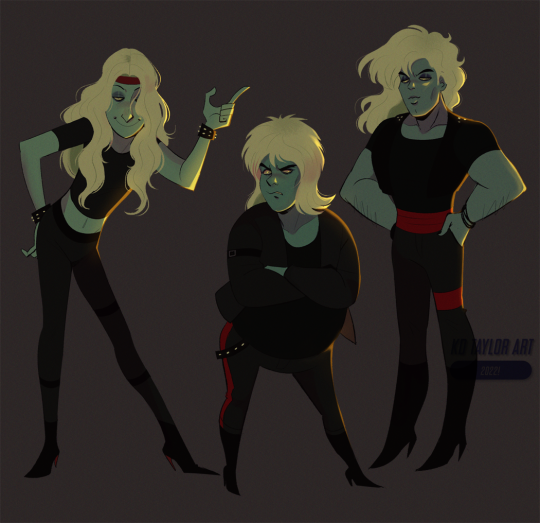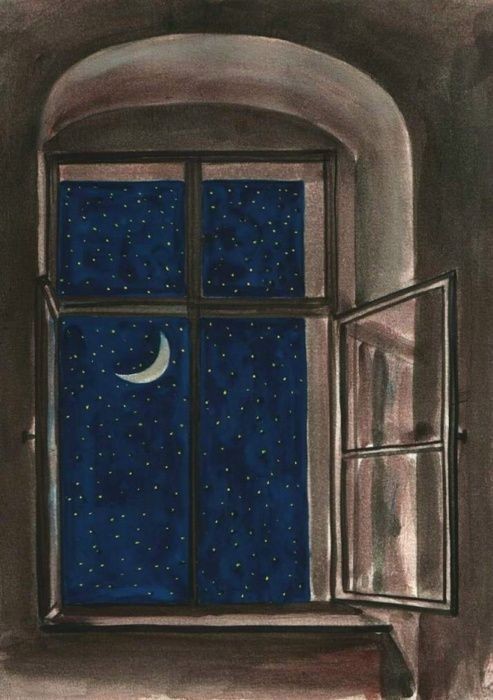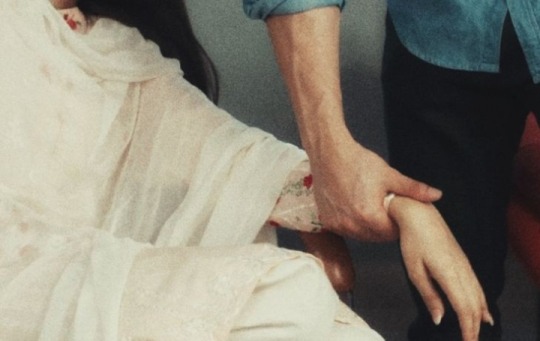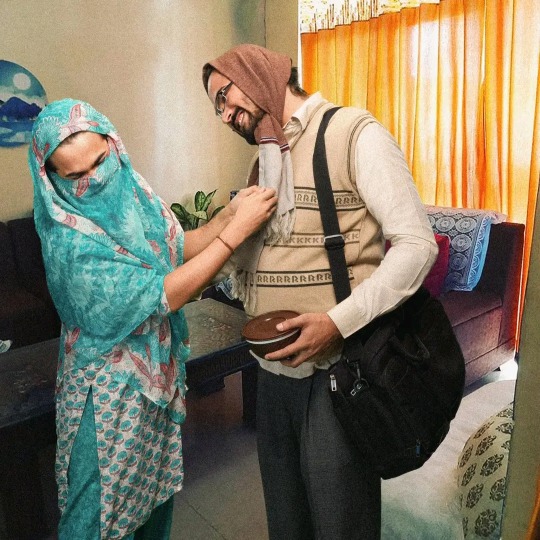#fasana
Text

FASANA - now Fazana / Croatia.
0 notes
Text


Happy Friday 13th, here's some glam rock ghouls!!!
I have this garbage-ass "horror-comedy 80s slasher movie" idea about this glam rock band that died in a stage accident, and how three of them came back from the dead while the fourth member's soul got sent to Hell (lol). in an attempt to get their buddy back, Aubrey, Robin, and Jasper go on a slashing spree in order to gain the attention of Satan and subsequently get sent to Hell so that they can perform together again (in the underworld of course).
Yeah it's stupid but I still think it's funny
#Robin Mogila#Aubrey Lachaise#Jasper Fasana#unnamed project#original art#artses and fartses#artist on tumblr
28 notes
·
View notes
Text
दुख फ़साना नहीं कि तुझ से कहें
दिल भी माना नहीं कि तुझ से कहें
आज तक अपनी बेकली का सबब
ख़ुद भी जाना नहीं कि तुझ से कहें
बे-तरह हाल-ए-दिल है और तुझ से
दोस्ताना नहीं कि तुझ से कहें
एक तू हर्फ़-ए-आश्ना था मगर
अब ज़माना नहीं कि तुझ से कहें
क़ासिदा हम फ़क़ीर लोगों का
इक ठिकाना नहीं कि तुझ से कहें
ऐ ख़ुदा दर्द-ए-दिल है बख़्शिश-ए-दोस्त
आब-ओ-दाना नहीं कि तुझ से कहें
अब तो अपना भी उस गली में 'फ़राज़'
आना जाना नहीं कि तुझ से कहें
0 notes
Text
By Hugh Ryan
I’ve always loved public libraries. They were my refuge as an isolated, nerdy queer kid in the 1980s. They gave me my first jobs, and were the first places I found information about queer history. Limited, sure—but still better than anything I’d gotten from school, or my family, or on television, or anywhere else.
Unfortunately, these days public libraries are embattled spaces. My hometown of New York City is looking to cut $36 million from the library budget this year, a devastating blow to an already overburdened system. Librarians across the country have been attacked as groomers and pedophiles for simply allowing queer books on the shelves. Perhaps most troubling, Republican lawmakers and presidential hopefuls seem intent on driving queer content from the public sphere entirely—out of libraries and off school syllabuses. Somehow, for people who never seem to have set foot in a library in their lives, they understand this crucial truth: Destroying our history is the first step to destroying our present and future. As a result, independent and private queer archives—which may once have seemed quaint, parochial, or no longer necessary in our age of acceptance—now feel like our one essential firewall holding fast against the genocidal ’phobic fantasies of anti-queer bigots.
For decades, long before this current round of attacks started, these indie archives and their dedicated staff have worked to preserve and protect queer history against exactly this kind of threat. You probably don’t know the name Paul Fasana, but read enough LGBTQ history and he pops up in book after book over the last three decades—not in the text itself, but in the acknowledgments: Pink Triangle Legacies (2022);Language Before Stonewall (2019); Greetings From the Gayborhood (2008), Becoming Visible (1998). From 1995 until literally the week he died in April 2021, Fasana volunteered as chief archivist for the Stonewall National Museum, Archives & Library in Fort Lauderdale, Florida, one of the oldest and largest independent queer archives in the United States.
As Pink Triangle Legacies author W. Jake Newsome told me, “Fasana has done more to provide access to our queer pasts than anyone else I’ve known … Paul listened patiently as I described my project and then pointed me toward sources that helped me answer questions that I didn’t even know I was asking. He didn’t need a finding aid; it seemed that he knew every document, box, and item by heart.”
A working-class gay man and first-gen college student, Fasana came out in the late 1950s, while getting a master’s of library science at UC-Berkeley (where he later established a scholarship for queer students). After rising through the ranks at the New York Public Library, he moved to Florida in the mid-’90s and began the herculean task of organizing SNMAL’s holdings. Since 1972, SNMAL has been a crucial safeguard of queer history—particularly queer Southern history—but like all independent queer archives, its fragile existence has long depended on volunteers like Fasana, passionate pencil pushers who perform the inglorious yet absolutely necessary day-to-day work.
By the time Fasana came on board, SNMAL’s holdings had grown precipitously, particularly as it rescued vast collections from men dying in the first wave of the AIDS crisis. Out of a jumble spread across three different warehouses, Fasana knit the collections together into one usable archive—an archive that has been powering queer scholarship and community in southern Florida and across the country ever since. Today, in honor of Fasana and his partner, Robert Graham, SNMAL’s collection is known as the Fasana/Graham Archive.
According to Hunter O’Hanian, who served as executive director of SNMAL during part of Fasana’s tenure, “More than any other single individual, [Paul Fasana] is responsible for the richness of the vast archives at Stonewall. Thousands of pages in the archive bear his carefully handwritten notes in pencil … Future generations of scholars and researchers will owe him a debt of gratitude.”
Just how big of an archive are we talking? Stacked vertically, SNMAL’s collections would reach twice the height of the Empire State Building. Counting just the paper files alone, there are six million pages of material. And SNMAL is just one of the queer archives working independently, at the margins of financial solvency, to keep our history out of the trash and in the hands of people like me, and you, and those who come after us.
How many such archives exist is impossible to say, but it’s not a large number. Our community institutions expand and contract over time, growing, shrinking, founding, floundering. Dr. Mahesh Somashekhar at the University of Illinois at Chicago has been using the archives of the Gayellow Pages to come up with an estimate, but the numbers fluctuate wildly: 16 in 1976, 56 in ’87, 20 in ’96, 80 in ’08. Today, who knows?
One of the first such archives in the world was founded in Berlin in 1919 by the groundbreaking queer researcher Magnus Hirschfeld. Called the Institut für Sexualwissenschaft (the Institute of Sexology), it was burned by Nazis in 1933. Around 20,000 books up in smoke—we have only some idea of what all was lost. But we know Hirschfeld and the Institut were on the forefront of trans medicine, social science, and activism. We know why the reactionaries came for us then; we know why they are coming for us now. It’s amazing how little can change in 90 years.
Recently, the photographer Matthew Leifheit has been documenting independent queer archives, from the large players like Stonewall to tiny personal shrines like the Christine Jorgensen Memorial Bathroom in Brooklyn. Leifheit feels a gravitational pull to these spaces. With the photos, he’s not trying to document their holdings, but “to pass along some of the emotion and wonder of discovering things in the archive.” He sees them as akin to the relics of saints, sitting at the intersection of myth and history.
Leifheit arrived at SNMAL just after Paul Fasana died. It was so soon after, the chief archivist’s desk was still cluttered with the stuff of his life—the stuff of our lives. Look at them, look at them all looking back at you: the queens, the kings, the obituaries and unbroken hearts. They are our fragile, flammable legacy, and we can lay our hands on them only because of the work of people like Paul Fasana.
0 notes
Text
By Hugh Ryan
I’ve always loved public libraries. They were my refuge as an isolated, nerdy queer kid in the 1980s. They gave me my first jobs, and were the first places I found information about queer history. Limited, sure—but still better than anything I’d gotten from school, or my family, or on television, or anywhere else.
Unfortunately, these days public libraries are embattled spaces. My hometown of New York City is looking to cut $36 million from the library budget this year, a devastating blow to an already overburdened system. Librarians across the country have been attacked as groomers and pedophiles for simply allowing queer books on the shelves. Perhaps most troubling, Republican lawmakers and presidential hopefuls seem intent on driving queer content from the public sphere entirely—out of libraries and off school syllabuses. Somehow, for people who never seem to have set foot in a library in their lives, they understand this crucial truth: Destroying our history is the first step to destroying our present and future. As a result, independent and private queer archives—which may once have seemed quaint, parochial, or no longer necessary in our age of acceptance—now feel like our one essential firewall holding fast against the genocidal ’phobic fantasies of anti-queer bigots.
For decades, long before this current round of attacks started, these indie archives and their dedicated staff have worked to preserve and protect queer history against exactly this kind of threat. You probably don’t know the name Paul Fasana, but read enough LGBTQ history and he pops up in book after book over the last three decades—not in the text itself, but in the acknowledgments: Pink Triangle Legacies (2022);Language Before Stonewall (2019); Greetings From the Gayborhood (2008), Becoming Visible (1998). From 1995 until literally the week he died in April 2021, Fasana volunteered as chief archivist for the Stonewall National Museum, Archives & Library in Fort Lauderdale, Florida, one of the oldest and largest independent queer archives in the United States.
As Pink Triangle Legacies author W. Jake Newsome told me, “Fasana has done more to provide access to our queer pasts than anyone else I’ve known … Paul listened patiently as I described my project and then pointed me toward sources that helped me answer questions that I didn’t even know I was asking. He didn’t need a finding aid; it seemed that he knew every document, box, and item by heart.”
A working-class gay man and first-gen college student, Fasana came out in the late 1950s, while getting a master’s of library science at UC-Berkeley (where he later established a scholarship for queer students). After rising through the ranks at the New York Public Library, he moved to Florida in the mid-’90s and began the herculean task of organizing SNMAL’s holdings. Since 1972, SNMAL has been a crucial safeguard of queer history—particularly queer Southern history—but like all independent queer archives, its fragile existence has long depended on volunteers like Fasana, passionate pencil pushers who perform the inglorious yet absolutely necessary day-to-day work.
By the time Fasana came on board, SNMAL’s holdings had grown precipitously, particularly as it rescued vast collections from men dying in the first wave of the AIDS crisis. Out of a jumble spread across three different warehouses, Fasana knit the collections together into one usable archive—an archive that has been powering queer scholarship and community in southern Florida and across the country ever since. Today, in honor of Fasana and his partner, Robert Graham, SNMAL’s collection is known as the Fasana/Graham Archive.
According to Hunter O’Hanian, who served as executive director of SNMAL during part of Fasana’s tenure, “More than any other single individual, [Paul Fasana] is responsible for the richness of the vast archives at Stonewall. Thousands of pages in the archive bear his carefully handwritten notes in pencil … Future generations of scholars and researchers will owe him a debt of gratitude.”
Just how big of an archive are we talking? Stacked vertically, SNMAL’s collections would reach twice the height of the Empire State Building. Counting just the paper files alone, there are six million pages of material. And SNMAL is just one of the queer archives working independently, at the margins of financial solvency, to keep our history out of the trash and in the hands of people like me, and you, and those who come after us.
How many such archives exist is impossible to say, but it’s not a large number. Our community institutions expand and contract over time, growing, shrinking, founding, floundering. Dr. Mahesh Somashekhar at the University of Illinois at Chicago has been using the archives of the Gayellow Pages to come up with an estimate, but the numbers fluctuate wildly: 16 in 1976, 56 in ’87, 20 in ’96, 80 in ’08. Today, who knows?
One of the first such archives in the world was founded in Berlin in 1919 by the groundbreaking queer researcher Magnus Hirschfeld. Called the Institut für Sexualwissenschaft (the Institute of Sexology), it was burned by Nazis in 1933. Around 20,000 books up in smoke—we have only some idea of what all was lost. But we know Hirschfeld and the Institut were on the forefront of trans medicine, social science, and activism. We know why the reactionaries came for us then; we know why they are coming for us now. It’s amazing how little can change in 90 years.
Recently, the photographer Matthew Leifheit has been documenting independent queer archives, from the large players like Stonewall to tiny personal shrines like the Christine Jorgensen Memorial Bathroom in Brooklyn. Leifheit feels a gravitational pull to these spaces. With the photos, he’s not trying to document their holdings, but “to pass along some of the emotion and wonder of discovering things in the archive.” He sees them as akin to the relics of saints, sitting at the intersection of myth and history.
Leifheit arrived at SNMAL just after Paul Fasana died. It was so soon after, the chief archivist’s desk was still cluttered with the stuff of his life—the stuff of our lives. Look at them, look at them all looking back at you: the queens, the kings, the obituaries and unbroken hearts. They are our fragile, flammable legacy, and we can lay our hands on them only because of the work of people like Paul Fasana.
0 notes
Text
“You probably don’t know the name Paul Fasana, but read enough LGBTQ history and he pops up in book after book over the last three decades—not in the text itself, but in the acknowledgments…”
1 note
·
View note
Text
The Unknown Librarian Who Saved Queer History
By Hugh Ryan for Harper's Bazaar
Published: Jun 28, 2023
You probably don’t know the name Paul Fasana, but read enough LGBTQ history and he pops up in book after book over the last three decades—not in the text itself, but in the acknowledgments: Pink Triangle Legacies (2022); Language Before Stonewall (2019); Greetings From the Gayborhood (2008), Becoming Visible (1998). From 1995 until literally the week he died in April 2021, Fasana volunteered as chief archivist for the Stonewall National Museum, Archives & Library in Fort Lauderdale, Florida, one of the oldest and largest independent queer archives in the United States.
Read the full article on Harper's Bazaar.
1K notes
·
View notes
Text
جو ہم پہ گزری ہے شاید سبھی پہ گزری ہے
فسانہ جو بھی سُنا، کچھ سُنا سُنا سا لگا
اقبال عظیم

Jo hum pe guzri hai shyd sabhi pe guzri hai
Fasana jo bhi suna, kuch suna suna sa laga
-Iqbal Azeem
#اقبال عظیم#اردو شعر#اردو ادب#اردو شاعری#اردو غزل#اردو#اردو پوسٹ#iqbal azeem#urdu quote#urdupoetry#urdu shayari#urdu ghazal#urdu literature#urdu lines#urdu stuff#urdu#پاکستان#desi tumblr#just desi things#desi larki#life of a desi girl#desi academia#pakistan#urdu aesthetic#desi culture#pakistani aesthetics
168 notes
·
View notes
Text

Dukh fasana nhi ki tujhse kahein dil bhi mana nhi ki tujhse kahein aaz tak apni bekali ka sabab khud bhi jana nhi ki tujhse kahein ek tu harf ashna tha magar ab zamana nhi ki tujhse kahein
-Ahmed Faraz
(If there's no reason to stay..is a good reason to go)
79 notes
·
View notes
Text
In English they say "Love and compassion are necessities, not luxuries. Without them, humanity cannot survive." But in Bollywood we say.....
Rag rag woh samaya mere... Dil par woh chhaya mere.... 🩺🫀
Mujhme vo aise jaise jaan.... Gire barsaat me paani jaise.... ☔✨
Koi kahaani jaise dil se ho dil tak jo bayaan... Aashiq dil tera puraana hai ye 👩🏻❤️👨🏻👴🏻
Deewana Deewana samjhe na ho 😮💨
Kabhi chup chup rahe.... Kabhi gaaya ye kare... 🫣📣
Bin poochhe teri taarife sunaya yeh kare... Hai koi haqiqat tu ya koi fasana hai.... 🧠🫀
Kuch jaane agar to itna ke.... Yeh tera deewana hai.... Re mann mera, mane na mann mera.... 💫🦸🏻♂️👸🏻

Bablu Ji and Janaki Devi are power couple. Periodt! 👑
#desi memes#desi tag#desi teen#desi tumblr#desi aesthetic#desi shit posting#desi things#aesthetic#artists on tumblr#desi academia#desi love#desi humor#just desi things#desiblr#desi#desire#love quotes
28 notes
·
View notes
Text

zindagi yun thi k jeeney ka bahana tu tha
hum faqt zaib-e-hikayat the, fasana tu tha


hum ney jis jis ko bhi chaaha terey hijraan men, woh log
aatey jaatey huye mausam the, zamana tu tha
-Ahmed Faraz
#ahmad faraz#urdu poetry#urdu literature#poetry#desi#dark academia#mehreen khan#desi academia#mahira khan#desi tumblr#desi dark academia#desiblr#desi romance#desi aesthetic#poetry aesthetic#poetry blog#urdu academia#urdu ghazal
89 notes
·
View notes
Text
In English, people say
"I want to see her again. I miss her."
But in urdu kaifi khalil said,
"Deewana hua, mastana hua,
Teri chahat me kitna fasana hua,
Tere aane ki khushboo, tere jane ka manzar
Tujhe milna padega ab zamana hua"
#urdu literature#urdu poetry#urdu lines#hindi shayari#urdu#urdu shayari#desi kahani#desi people#desi posts#love
12 notes
·
View notes
Text
why is it always "i love u" and never "chupke se aake tune , dil mein samake tune , chhed diya kaisa ye fasana ? eitabar bhi tujhise hota h , dil lagane ka tuhi tareeka h"
#desi boys#desiblr#desi tag#bollywood#desi stuff#ikshitatalks#love language#desi things#desi girl#alia bhatt#varun dhawan#anyways slayyy
426 notes
·
View notes
Text
meri shaadi pe meri entry pe exact ye gaane ki ye line honi chahiye
"odh ke dhani reet ki chaadar
aaya tere sheher mein ranjha Tera
duniya zamana jhutha fasana
jeene marne ka vaada sancha mera
shessh mehel na mujhko suhayew
tujh sang sukhi roti bhaye"
17 notes
·
View notes
Text
Be-naam fareha- Jaun Elia
UNNAMED FAREHA
Saari baatein bhool jana fareha
Tha wo sab kuch ek fasana fareha
forget all the matters Fareha
it was all just a story Fareha
Haan mohabbat ek dhoka hi to thi
Ab kabhi dhoka na khana fareha
yes, love was nothing but a deception
now never be deceived Fareha
Chhed de gar koi mera tazkera
Sun ke tanzan muskurana fareha
if someone were to mention me
hear and smile sarcastically Fareha
Meri jo nazmein tumhare naam hain
Ab unhein mat gungunana fareha
my poems that are named after you
now do not hum them Fareha
Tha faqat roohon ke naalon ki shikast
Wo tarannum, wo taraana fareha
there was only the defeat of the drains of souls
that way of singing, that melody, Fareha
Bahes kya karna bhala halaat se
Haarna hai, haar jana fareha
what to argue with the circumstances
have to get defeated, get defeated Fareha
Saaz-o-barg-e-aish ko meri tarah
Tum nazar se mat giraana fareha
Do not let the luxurious belongings as i did
fall from your sight Fareha
Hai shaoor-e-gham ki ek qeemat magar
Tum ye qeemat mat chukana fareha
there is a price to the awareness of sorrow but
do not pay this price Fareha
Zindagi hai fitratan kuchh bad-mizaaj
Zindagi ke naaz uthaana fareha
Life is inherently somewhat unpredictable
bear with the whims of life Fareha
Peshkash mein phool kar lena qubool
Ab sitaare mat mangana fareha
accept the offering of flowers
now don't ask for stars, Fareha
Chand weerane tasawwur mein rahein
Jab nayi duniya basana fareha
when the deserted wilderness is in imagination
start a new life, Fareha
Jaanib-e-ishrat gah-e-shehar-e-bahaar
Ho sake to milke jaana fareha
Towards the abode of joy, the city of spring
If possible, meet and go, Fareha
Sochta hun kis qadar tareek hai
Ab mera baqi zamana fareha
I wonder how dark it is
Now, the rest of my time, Fareha
Sunn raha hun manzil-e-ghurbat se door
Baj raha hai shadiyana fareha
I am hearing, being far from the destination of solitude
The wedding music is playing, Fareha
Mauj-zan pata hun main ek sail-e-rang
Az-qafas-taa-aashiyana fareha
I know how to create waves, like a painter of colors
from the cage to the nest, Fareha
Ho mubarak rasm-e-taqreeb-e-shabaab
Bar-murad-e-khusrawana fareha
Congratulations on the ceremony of youthful beauty
May your desires be fulfilled, Fareha
Saj ke wo kaisa laga hoga jo tha
Ek khwaab-e-shayerana fareha
how would he have looked adorned, who was
a poetic dream Fareha
Sochta hun main, ke mujh ko chahiye
Ye khushi dil se manana fareha
I think that i need to
wholeheartedly embrace this happiness Fareha
Kya hua gar zindagi ki raah mein
Hum nahin shana-ba-shana fareha
What happens if on the path of life
we are not side by side Fareha
Waqt shayad aap apna jabr hai
Us pe kya tohmat lagana fareha
Perhaps time in itself is tyranny
why accuse it, Fareha
Zindagi ek naqsh-e-be-naqqaash hai
Us pe kya ungli uthana fareha
Life is an uncarved design
Why raise a finger at it, Fareha
Kash ek qanun hota jo nahin
Zakhm apne kya dikhana fareha
I wish there was a law that didn't exist
Why show your wounds, Fareha
Kash kuch iqdaar hote jo nahin
Phir bhala dil kya jalana fareha
I wish there were some choices that don't exist
why burn your heart, Fareha
Sirf ek jalti hui zulmat hai noor
Taab-o-tabish par na jana fareha
light is only a burning darkness
dont be fooled by it's heat and fervor Fareha
Ye jo sab kuch hai ye shayad kuch nahin
Rog jee ko kya lagana fareha
This everything that exists this might be nothing
why make the heart ill Fareha
Sail hai, bas be-karaan lamhon ka sail
Gharq-e-sail-e-be-karaana fareha
It's a journey, just a collection of aimless moments
Drowning in the sea of purposeless journey, Fareha
25 notes
·
View notes